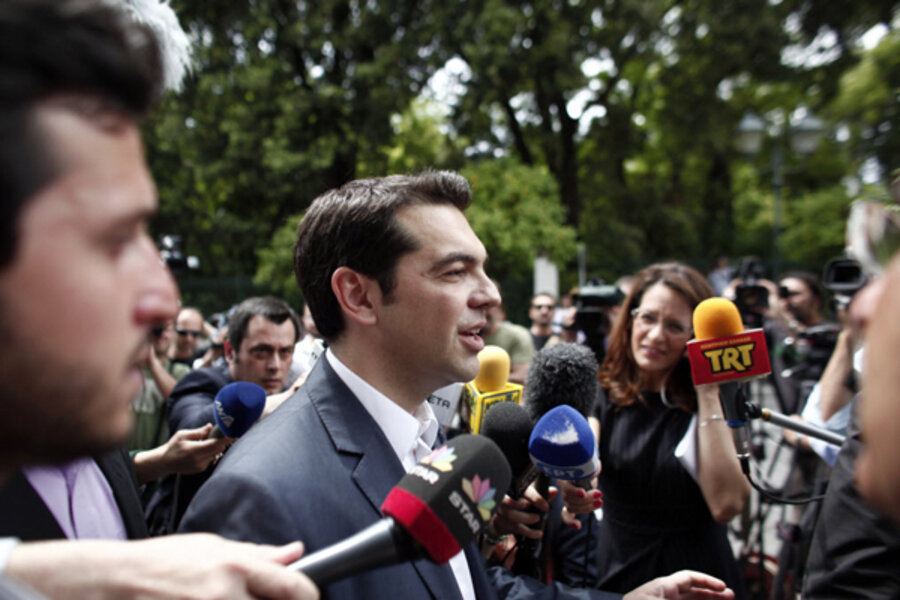Is Greece headed for do-over election?
Loading...
| Athens
A second attempt to form a coalition government in Greece failed today, making a June re-do of national elections the most likely scenario and leaving Greece in limbo for a month.
Alexis Tsipras, the leader of Syriza (Coalition of the Left), which came in second in the elections, yesterday got the mandate to form a government. He met earlier today with both Antonis Samaras, president of the center-right New Democracy party, and Evangelos Venizelos, president of the Socialist PASOK party, but failed to bring them on board.
Forty years of bipartisanship between New Democracy and PASOK ended on May 6, when, with 67 percent turnout, Greeks turned to parties other than the two traditional governing parties in record numbers, showing their anger with austerity measures.
Although New Democracy received the most votes – 18.85 percent – and PASOK came in third with 13.18 percent (behind Syriza with 16.78 percent), they didn’t get enough votes to form a parliamentary majority. New Democracy was given the first opportunity to form a government. When it failed, the opportunity passed to Mr. Tsipras. Tsipras managed to get the support only of the Democratic Left, but still lacked enough seats to form a government.
The baton is now expected to be passed to PASOK, which came in third. Mr. Venizelos has proposed a unity government made up of New Democracy, PASOK, Syriza, and Dimar, another left party, setting as his only condition that the country remain in the eurozone, which even Syriza supports.
Syriza's participation is essential for the coalition government to represent the voters, 66 percent of whom chose anti-bailout parties. But the gap between Tsipras's stance on the bailout and that of PASOK and New Democracy might be too vast. If there’s no change in the political leaders’ stances in the next few days, it’s unlikely that PASOK will be able to gather enough partners, making another election the most likely scenario.
Political leaders are hoping that with new coalitions and more time, they will be able to gain votes in the second election from the 18 percent of the electorate that voted for parties that didn't reach the threshold to get into parliament.
Tsipras outlined five basic premises for the left coalition government he proposed, some of which make it impossible for him to enter into a government with either of the mainstream parties:
- The cancellation of the austerity measures imposed by the previous governments and the abolition of “the shameful laws which further cut wages and pensions”
- The repeal of laws that he says violate basic labor rights
- Changes to the political system, such as the introduction of proportional representation and the elimination of a law protecting former government ministers from prosecution
- State inspections of the Greek banking system and publication of the Black Rock report on the Greek banks, which shows whether banks have set aside enough for bad loans.
- The creation of an international commission to monitor Greece's “odious public debt” and put a moratorium on repayment.
Tsipras also called on Samaras and Venizelos, whose parties acquiesced to the conditions attached to the bailout agreements with the European Union and International Monetary Fund, to send a letter to the European leaders stating that their previous commitments are not valid. Samaras responded harshly, essentially shutting the door to any cooperation, while Venizelos said he was awaiting for his meeting with Tsipras to respond.
Samaras called today for the mobilization of all forces of the center-right and called on Tsipras to stop "this irresponsibility" since, as he said, the unilateral rejection of the EU bailout agreement would lead to Greece's exit from the eurozone.
Yesterday, in a campaign-style speech, Tsipras said that the election results can’t be misinterpreted and “the people want a left government.”
“Austerity and recession are leading to the strengthening of anti-EU and anti-democratic parties,” said Dimitris Charalambis, professor of political science at the University of Athens.
After François Hollande’s victory in France and the destabilization of governments, not just in southern Europe but also in the Netherlands, experts in Greece say that Germany will need to rethink its stance towards the debt-burdened countries.
“Because of all this, Germany will have to either accept that the loans turn into long-term ones with lower interest rates, or it will need to tolerate higher deficits for a short period of time," Mr. Charalambis said.







